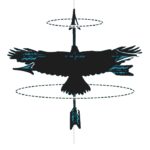Kathy Fish teaches for the Mile High MFA at Regis University in Denver, Colorado. She has published four collections of short fiction: a chapbook in the Rose Metal Press collective, A Peculiar Feeling of Restlessness: Four Chapbooks of Short Short Fiction by Four Women (2008); Wild Life (Matter Press, 2011); Together We Can Bury It (The Lit Pub, 2012); and Rift, co-authored with Robert Vaughan (Unknown Press, 2015). Three of her stories have been Best Small Fictions winners, most recently “Collective Nouns for Humans in the Wild,” chosen by Aimee Bender. Additionally, two of Fish’s stories will be featured in the upcoming W.W. Norton anthology, New Micro: Exceptionally Short Fiction.
Our fiction editor, Cathy Ulrich, asked Kathy a few questions about her linked micros published by Pidgeonholes on May 21, 2018.
ULRICH: What I love about these interconnected pieces is how much history they hold, how expansive they feel for their tininess. How do you manage that trick of making something so small seem so very large?
FISH: Thank you, Cathy. I think if you write a lot of flash fiction, you learn to find these sort of signifiers in a character’s life that have an encompassing feel to them. So with Betsy, I touched on a few things that give a sense of the entire arc of her life. And they don’t all have to be Big Moments. I think it’s a signifier for Betsy when she copes with the Lamb boys by “chalking unflattering likenesses of [them] on her driveway.” And I announce that as a signifier in the title, “Betsy Becomes an Artist.” And each micro is another example of Betsy’s “becoming.” And then I found ways to show the passage of time in the growth of the sugar maple, the changes in the families on the cul-de-sac and so forth.
ULRICH: Betsy’s story is the neighborhood’s story, her tragedy the neighborhood’s tragedy. At the end, she has gone and the remaining Lamb brother doesn’t know where. Is her absence something that felt inevitable to you? From the beginning, did you always have a sense that Betsy would have to leave?
FISH: That’s exactly right: “Betsy’s story is the neighborhood’s story.” Now it seems odd to me and I’m glad I revised it, but an early draft of this was more traditionally structured, not in a series of micros, and was called “The Playwright.” And all the events of the story served to show what she’d eventually make plays about. I still kind of like the idea of that, but I couldn’t pull it off. And the more I wrote about her, the more I wanted her to disappear at the end, away from this place and these people, into a vague future without them. Without Betsy at the core, the rest just dissolves away, with Mrs. Lamb withered away, the sugar maple cut down, and the Golds pondering the nature of love.
ULRICH: There are some recurring motifs in these — the sugar maple, the Golds’ on-again off-again marriage. Each piece ends with the comparison of the Lamb family matriarch to Halley’s comet, rarely seen, ice and dust. The only piece that is missing two of these motifs is Betsy Becomes a Pariah, yet the comet simile remains. That seems very intentional — why did you choose to have this piece stand apart from the rest?
FISH: You are such a perceptive reader, Cathy. I really wanted that piece to focus squarely on Betsy. It’s a heartbreaking, harrowing moment in her life, and one in which Mrs. Lamb could have made a significant difference, but did not. I wanted it to “sound” different from the other micros and I wanted that bit about Mrs. Lamb (“A comet’s heart is essentially a dirty snowball.”) to serve as a hard, cold, full-stop.
ULRICH: Betsy is such a very real character from the moment of her introduction, that old-fashioned name because her parents don’t expect her to live, the chalk art, the orthopedic shoes. When a character is so real like that, is it hard for you when they are hurt, the way Betsy is?
FISH: It absolutely is! But I’ve never written anything worthwhile that came from making my characters’ lives easy. And I know any pain I put them through has its source in some version of my own pain. So in a sense, I’m hurting myself in the process as well. If I didn’t believe this process was ultimately healing, I would probably go find more pleasant ways to pass the time.
ULRICH: The Lamb boys remain unnamed throughout, except for Robbie, the incarcerated one who returns home at the end. What made you choose to give only him a first name?
FISH: I’m sort of obsessed with children in groups, Cathy. The particular dynamics of children in groups, especially siblings, fascinates me. They seem to have their own language and culture, their own myths and traditions. They become a character in and of themselves. So I like them being simply, “the three Lamb boys” as a collective that moves and acts through the story, and then to have Robbie Lamb as a separate entity in the story, with his own arc.
ULRICH: The Golds want to ask Robbie more questions at the end, “where are the new people,” “what is the nature of love,” but they stop because they don’t like his eyes. If they had managed to ask, do you think he could have answered?
FISH: Ah, in an earlier draft he actually does answer them! I had him go on at length, but in the end, it sounded false to my own ears, to have this ruined man be so generous and articulate. I didn’t want the Golds to get their answers anyway.
You can read Kathy’s linked micros about here.
Logo by: Robert James Russell
